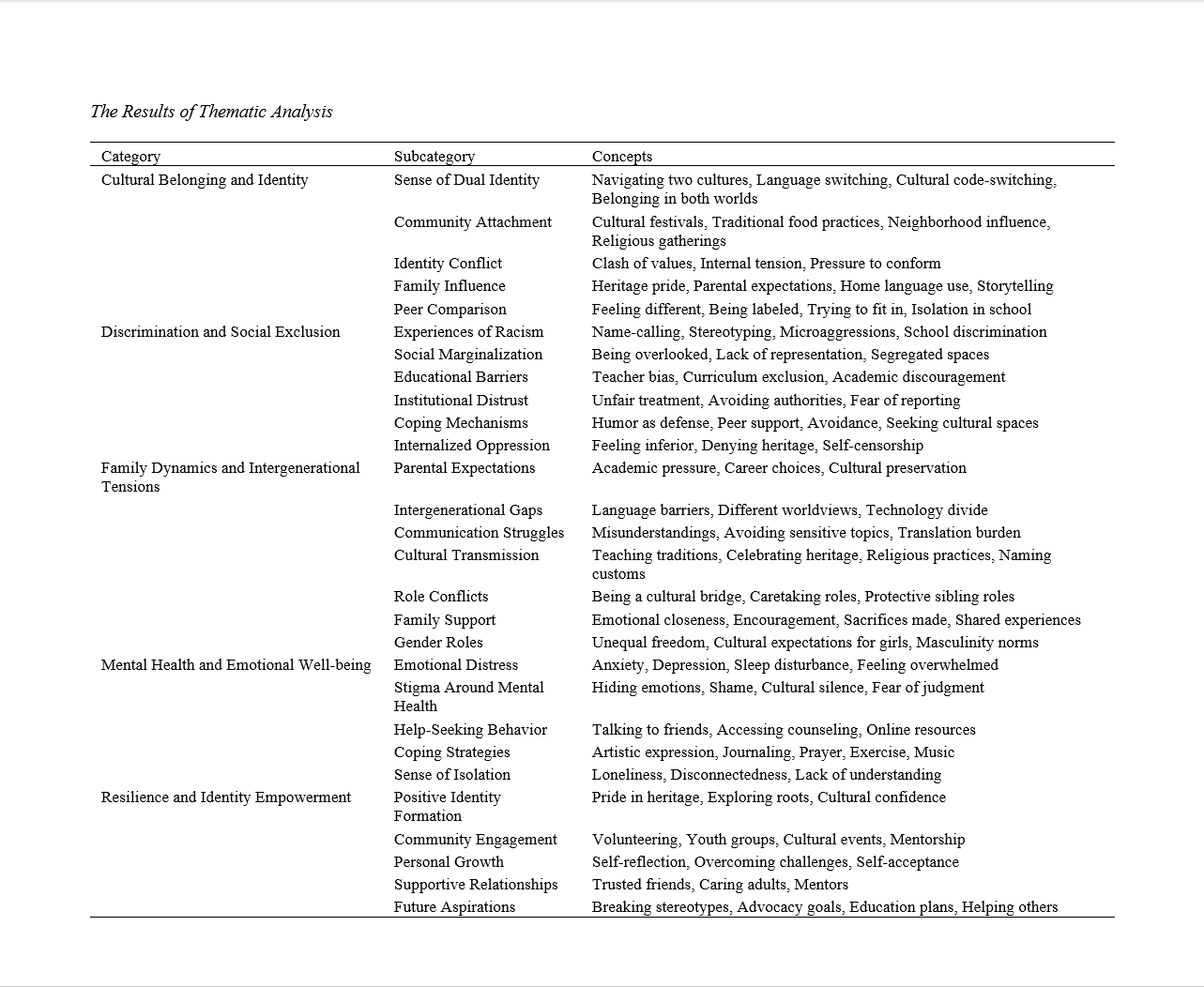The Influence of Cultural Identity on Mental Health in Ethnic Minority Youth
Keywords:
cultural identity, ethnic minority youth, mental health, qualitative research, Turkey, resilience, stigma, discriminationAbstract
Objective: This study aimed to explore the ways in which cultural identity influences the mental health of ethnic minority youth in Turkey.
Methods and Materials: A qualitative research design was employed, using semi-structured interviews with 31 ethnic minority youth aged 15 to 24, from various backgrounds including Kurdish, Arab, Laz, Zaza, and Circassian communities. Participants were selected through purposive sampling, and data collection continued until theoretical saturation was achieved. Interviews were transcribed verbatim and analyzed thematically using NVivo software. The study adhered to ethical research standards and ensured confidentiality, informed consent, and participant anonymity.
Findings: Five overarching themes were identified: Cultural Belonging and Identity, Discrimination and Social Exclusion, Family Dynamics and Intergenerational Tensions, Mental Health and Emotional Well-being, and Resilience and Identity Empowerment. Participants reported experiences of identity conflict, cultural stigma, and institutional exclusion that negatively impacted their mental health. At the same time, they demonstrated resilience through community engagement, family support, and cultural pride. The results revealed how cultural identity acts both as a source of psychological vulnerability and a foundation for empowerment among ethnic minority youth.
Conclusion: Cultural identity plays a dual role in shaping the mental health of ethnic minority youth, functioning both as a risk factor and a protective resource. Effective mental health interventions must consider the lived experiences, cultural narratives, and structural realities of minority youth to promote well-being and inclusion.
Downloads
References
Alarcão, V., Virgolino, A., Stefanovska–Petkovska, M., & Neves, J. C. (2022). Exploring the Effects of the COVID-19 Pandemic on Mental Health and Well-Being of Migrant Populations in Europe: An Equity-Focused Scoping Review. Behavioral Sciences, 12(10), 393. https://doi.org/10.3390/bs12100393
Bhugra, D., Gupta, S., Bhui, K., Craig, T., Dogra, N., Ingleby, D., Kirkbride, J. B., Moussaoui, D., Nazroo, J., Qureshi, A., Stompe, T., & Tribe, R. (2021). WPA Guidance on Mental Health and Mental Health Care in Migrants. 1-18. https://doi.org/10.1007/978-981-10-0750-7_44-1
Bilač, S., Öztop, F., Kutuk, Y., & Karadağ, M. (2024). Cultural Narratives and Their Impact on Family Mental Health. JPRFC, 2(2), 18-24. https://doi.org/10.61838/kman.jprfc.2.2.4
Boltivets, S. (2023). Cultural Beliefs and Mental Health. JPRFC, 1-3. https://doi.org/10.61838/kman.jprfc.1.4.1
Chu, E., White, F. A., & Verrelli, S. (2017). Biculturalism Amongst Ethnic Minorities: Its Impact for Individuals and Intergroup Relations. Australian Journal of Psychology, 69(4), 229-236. https://doi.org/10.1111/ajpy.12153
Cleworth, S., Smith, W. W., & Sealey, R. (2006). Grief and Courage in a River Town: A Pilot Project in the Aboriginal Community of Kempsey, New South Wales. Australasian Psychiatry, 14(4), 390-394. https://doi.org/10.1080/j.1440-1665.2006.02310.x
Dagsvold, I., Møllersen, S., & Stordahl, V. (2015). What Can We Talk About, in Which Language, in What Way and With Whom? Sami Patients' Experiences of Language Choice and Cultural Norms in Mental Health Treatment. International Journal of Circumpolar Health, 74(1), 26952. https://doi.org/10.3402/ijch.v74.26952
Erentaitė, R., Lannegrand‐Willems, L., Negru‐Subtirica, O., Vosylis, R., Sondaitė, J., & Raižienė, S. (2018). Identity Development Among Ethnic Minority Youth. European Psychologist, 23(4), 324-335. https://doi.org/10.1027/1016-9040/a000338
Gopalkrishnan, N. (2018). Cultural Diversity and Mental Health: Considerations for Policy and Practice. Frontiers in Public Health, 6. https://doi.org/10.3389/fpubh.2018.00179
Hansen, A., McGarry, D., Johnson, A., & Roche, M. (2021). The Impact of an Undergraduate Students' Culture on Their Learning About Mental Health: A Scoping Review. Nursing and Health Sciences, 23(2), 352-361. https://doi.org/10.1111/nhs.12835
Hayes, K., Berry, P., & Ebi, K. L. (2019). Factors Influencing the Mental Health Consequences of Climate Change in Canada. International journal of environmental research and public health, 16(9), 1583. https://doi.org/10.3390/ijerph16091583
Hui, W., & Zhao, Y. (2018). Status Identification and Identity Construction of Ethnic Minorities in the United States Based on Brain Cognitive Science. NeuroQuantology, 16(6). https://doi.org/10.14704/nq.2018.16.6.1540
Jain, S., & Jain, B. (2020). Stress Amongst Adolescents – An Alarm for Health Service Preparedness. Indian Journal of Community Health, 32(1), 6-7. https://doi.org/10.47203/ijch.2020.v32i01.003
Kirmayer, L. J. (2012). Rethinking Cultural Competence. Transcultural Psychiatry, 49(2), 149-164. https://doi.org/10.1177/1363461512444673
Laugharne, J., Glennen, M., & Austin, J. (2002). The “Maga Barndi” Mental Health Service for Aboriginal People in Western Australia. Australasian Psychiatry, 10(1), 13-17. https://doi.org/10.1046/j.1440-1665.2002.00385.x
Meredith, C., McKerchar, C., & Lacey, C. (2023). Indigenous Approaches to Perinatal Mental Health: A Systematic Review With Critical Interpretive Synthesis. Archives of Women S Mental Health, 26(3), 275-293. https://doi.org/10.1007/s00737-023-01310-7
Mereish, E. H. (2012). The Intersectional Invisibility of Race and Disability Status: An Exploratory Study of Health and Discrimination Facing Asian Americans With Disabilities. Ethnicity and Inequalities in Health and Social Care, 5(2), 52-60. https://doi.org/10.1108/17570981211286796
Mongelli, F., Georgakopoulos, P., & Pato, M. T. (2020). Challenges and Opportunities to Meet the Mental Health Needs of Underserved and Disenfranchised Populations in the United States. Focus the Journal of Lifelong Learning in Psychiatry, 18(1), 16-24. https://doi.org/10.1176/appi.focus.20190028
Park, J., Lee, E. J., Barker, K., Roberts, K., Tseng, Y. C., Elmer, J. W., & Tsen, J. (2023). Mental Illness Identity Development and Service Utilization Experiences Among Asian Americans With Mental Illness: A Qualitative Study. Psychiatric Rehabilitation Journal, 46(1), 36-44. https://doi.org/10.1037/prj0000557
Phinney, J. S. (1996). When We Talk About American Ethnic Groups, What Do We Mean? American psychologist, 51(9), 918-927. https://doi.org/10.1037/0003-066x.51.9.918
Phinney, J. S., Horenczyk, G., Liebkind, K., & Vedder, P. (2001). Ethnic Identity, Immigration, and Well‐Being: An Interactional Perspective. Journal of Social Issues, 57(3), 493-510. https://doi.org/10.1111/0022-4537.00225
Sørlie, T., & NergÅrd, J.-I. (2005). Treatment Satisfaction and Recovery in Saami and Norwegian Patients Following Psychiatric Hospital Treatment: A Comparative Study. Transcultural Psychiatry, 42(2), 295-316. https://doi.org/10.1177/1363461505052669
Thomeer, M. B., Moody, M. D., & Yahirun, J. (2022). Racial and Ethnic Disparities in Mental Health and Mental Health Care During the COVID-19 Pandemic. Journal of Racial and Ethnic Health Disparities, 10(2), 961-976. https://doi.org/10.1007/s40615-022-01284-9
Toktas, E. (2024). Mental Health Interventions in Family Contexts: A Cultural Approach. JPRFC, 1-3. https://doi.org/10.61838/kman.jprfc.2.3.1
Torres, A. (2024). Intergenerational and Cultural Parent-Child Protective Factors Against Depressive Symptoms in Filipino-American Adolescents. Berkeley Undergraduate Journal, 38(1). https://doi.org/10.5070/b3.35290

Downloads
Additional Files
Published
Submitted
Revised
Accepted
Issue
Section
License

This work is licensed under a Creative Commons Attribution-NonCommercial 4.0 International License.








